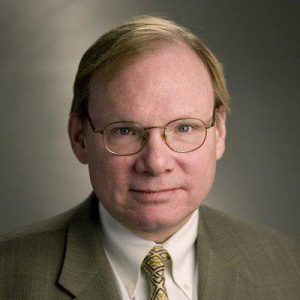#CMSC16 – EMD Serono’s Dr. Rick Munschauer Discusses Value of Annual Meeting
Written by |

With the Consortium of Multiple Sclerosis Centers (CMSC) 2016 fast approaching, Multiple Sclerosis News Today sat down with a man of far-reaching interest in multiple sclerosis (MS) — Dr. Rick Munschauer, Vice President of Medical Affairs, Neurology and Immunology at EMD Serono — to discuss why the 30th annual meeting is important to the pharmaceutical company that sees patient support and education as a prime mission.

Dr. Rick Munschauer, Vice President of Medical Affairs, Neurology and Immunology. Photo credit: EMD Serono.
EMD Serono, a biopharmaceutical company founded in Italy and later acquired by Merck KGaA, Darmstadt, Germany, belongs to one of the oldest pharmaceutical firms in the world. For more than 40 years, EMD Serono has focused solely on specialty care, including MS treatment.
The company’s MS drug Rebif (interferon beta-1a) launched on the market in 2002 and since then, EMD Serono has continued to gather information of its effects and safety, and to improve the drug’s delivery. The company’s research brought other MS compounds to clinical development as well. Currently, it is in preparatory mode for seeking approval for cladribine tablets from the European Medicines Agency (EMA).
But what makes EMD Serono stand out from most pharmaceutical businesses is at the heart of the company’s MS LifeLines patient support and education service. The program connects MS patients with experts in the field, healthcare support, financial advice and each other.
Munschauer, who joined EMD Serono a little over a year ago, has an impressive history in the world of neurology and MS having worked for and been a leader in academic institutions, pharmaceutical businesses, and research for more than 30 years.
CMSC 2016, June 1 – 4, at the Gaylord National Resort and Convention Center in National Harbor, Md., will host MS researchers and clinicians worldwide for three days of high level symposiums.
Munschauer explained to Multiple Sclerosis News Today why the meeting is important to EMD Serono. Below, is the question and answer interview.
Q: EMD Serono has participated in CMSC meetings in past years, and this year is no exception. Why?
Dr. Munschauer: We are very pleased to attend the 30th Annual Meeting of the Consortium of Multiple Sclerosis Centers. CMSC is one of the most important touch points for us with the professional community. We look forward to the meeting each year, as it’s an opportunity to gather with clinicians, researchers, care providers and others to discuss research, ideas and insights that can make a meaningful difference for patients living with MS.
Q: In your opinion, what are the particular strengths of CMSC that keep EMD Serono coming back year after year?
Dr. Munschauer: The CMSC meeting is unique in that it brings together people from across the MS care continuum – not just physicians, but also nurses, psychologists, social workers, researchers and others. These care providers offer valuable insights into burden of care and what is most important and relevant for MS patients. We see tremendous value in participating in the CMSC meeting each year because it provides an opportunity to share our own findings with people who truly understand the MS patient journey and can put that knowledge into action.
Q: Your company will sponsor a symposium at the meeting. What are the main highlights of the company’s presentations at CMSC 2016?
Dr. Munschauer: This year, EMD Serono is presenting seven abstracts at CMSC that demonstrate our commitment to patients and showcase the real-world and clinical experience of our treatment for relapsing MS, Rebif® (interferon beta-1a). We are particularly excited about three studies of real-world data that evaluate the burden of care among patients taking Rebif. Additionally, we are excited to discuss a new tool to facilitate patient-healthcare provider communication.
We have seen the impact of Rebif first-hand during our more than 20 years of combined clinical trial and patient experience. Rebif has been used by more than 130,000 patients in the U.S alone since approval. Through the studies being presented at CMSC, we are adding to our growing body of knowledge, as well as gaining a better understanding of relapsing MS and the patient journey.
We’ll be presenting abstracts about these and other studies during the poster presentation session on June 2.
Q: At this moment, what does EMD Serono perceive as the biggest challenge in MS?
Dr. Munschauer: One of the biggest challenges is that MS affects each patient differently. The goal is to find a therapy that works best for each individual patient. By taking a patient-centered approach to MS care, there will be better opportunities to impact patient outcomes by further assessing the burden-of-disease, resource use, population demographics, individual patient characteristics, treatment pathways and improved adherence.
Q: What, in your opinion, might be the biggest breakthroughs for MS treatment in the next 5 to 10 years?
Dr. Munschauer: Overall, the MS treatment landscape has continued to evolve, offering patient and neurologists additional options. But the biggest breakthrough I believe is, what we are able to gather from real-world evidence, with a particular focus on patient support and burden of care. An important marker in the overall value of a medication is how it improved patient care and the overall impact it has on the healthcare system.
At EMD Serono, our support for patients and caregivers goes well beyond the medications we manufacture. EMD Serono has offered support to the MS community for more than 12 years through our MS LifeLines patient support service. MS LifeLines averages more than 300,000 connections with MS patients and their caregivers each year. It provides valuable education and resources, and connects patients to support center nurses, patient ambassadors and local patient programs.
Q: Is there a particular message EMD Serono would like to send out to MS patients?
Dr. Munschauer: EMD Serono is a patient-centered company committed to enhancing care for people living with MS. MS is a multi-faceted disease that comes with many emotional, physical and economic implications. It’s important for people living with MS to know they are not alone – and there is a vast network of supporters at CMSC and in the MS community who are there to support you. I encourage you to visit MS LifeLines and meet other patients and find helpful resources that can help you throughout your journey.
Multiple Sclerosis News Today will offer its readers on-site coverage of the 2016 CMSC Annual Meeting, including feature articles, interviews, and social media coverage on Facebook, Twitter, and Pinterest. Social media accounts for Multiple Sclerosis News Today can be found in the upper righthand corner of its homepage.





